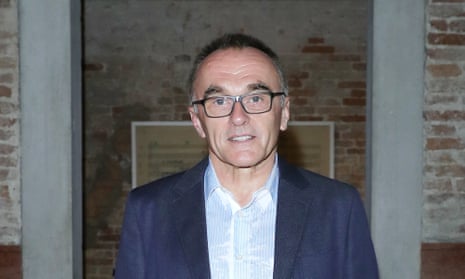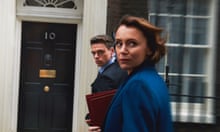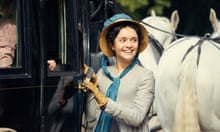Danny Boyle has called on film-makers and writers to “reach around the hollow cavern” of Brexit to ensure British TV and film continues to be seen as among the best in the world.
The director said working on his most recent production, the 10-part television drama Trust, which starts on BBC Two next week, had made him more determined to work with European production companies.
“The series is set in 1973, the year in which we joined Europe, so there was something ironic about the fact we were making it with the knowledge we were going to leave,” he said. “It just seemed more and more insane to us, especially as we were making it with this wonderful Italian co-production company.
“I can only hope that film-makers, writers, journalists will try to build around this. Airline companies certainly will, as will businesses. Right now it feels as though something has been severed and we’re adrift but I hope that people will try to compensate for this terrible void that’s been created for us by politicians.”
Trust, which tells the story of the kidnapping of John Paul Getty III, the grandson of the then richest man in the world, marks Boyle’s first return to TV since directing the pilot of the 2014 police drama Babylon. Trust was written by Simon Beaufoy, who worked with Boyle on Slumdog Millionaire and 127 Hours, and stars Donald Sutherland as John Paul Getty, Hillary Swank as Gail Getty, the kidnapped teenager’s mother, and Brendan Fraser as the fixer called in to sort everything out.
Beaufoy said he was interested in the story because of the “baroque level of dysfunction” within the Getty family. “On the face of it it seems like a small story about a rich kid who gets kidnapped, but the more I dug the more I found out about this family,” he said.
“The idea that three generations of this family had passed down this terrible absence of love from one generation to another was really compelling and I became increasingly fascinated by the idea that this kidnapping was the pivot around which you could tell the story of the richest family in the world and what unhappiness all that money bought to them.”
Boyle said the Gettys were “the first family to become a media story, a soap opera in the way that all rich families now are soap operas and we’re addicted to reading about them”.
The pair had already begun working on Trust when news broke that All the Money in the World, a film covering the same events and directed by Ridley Scott, was being made.
“You always see these stories about people in Hollywood doing two similar projects at the same time and it always strikes you as being ridiculous: why haven’t they got together and sorted it out?” said Boyle. “But really, we were already halfway down the runway when we found out that Ridley was planning his film.”
He said he watched Scott’s film after he had finished shooting Trust. “Oh God, of course I went to see it. It’s very, very enjoyable and bizarre seeing the same locations occasionally. If you think too much about two similar projects then eventually you start to go mad. You just have to hope that there’s enough difference in the two stories that they’ll be worthy of whichever one people select.”
The major difference between the two projects lies in Trust’s suggestion that the young John Paul Getty III (played by the rising star Harris Dickinson) was in on his own kidnapping, an action partially borne out of financial desperation and partially out of a teenager’s desire to know he was wanted.
“It’s not really that controversial an idea,” said Beaufoy. “A book came out not that long ago in which one of his girlfriends admitted it. There were lots of clues already suggesting that it might be the case, but she outright says it and that played into something which was so fascinating – the idea that this is a story not so much about money as about love and how people have tried to replace a lack of love with money and what a flawed and desperate notion that is.”
Working in television rather than film allowed them to take risks, including making an episode in Italian told from the point of view of the kidnappers and directed by Emanuele Crialese. “TV really emboldens you to do slightly challenging things like that, whereas film always seems slightly risk-averse because they’re putting all their money on the roulette wheel every time,” Beaufoy said.
Boyle agreed: “You feel with TV that they’ve already earned the money and are now spending it, rather than the other way round.
He said prestige TV owed a huge debt to the BBC. “Artistically I think that having tried to destroy the BBC they’re now all following it.”








